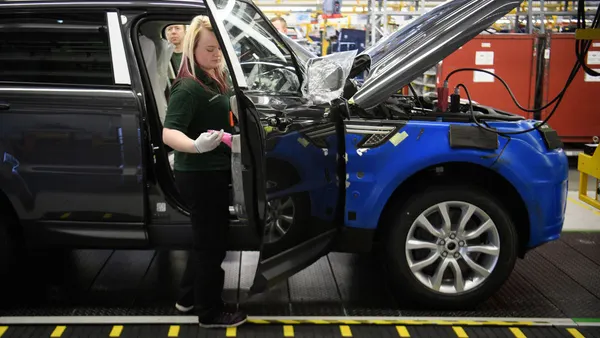Dive Brief:
- XPO Logistics has efforts in place at 95% of its warehouse locations focused on reducing energy use, according to the company's first sustainability report released Monday.
- It is also working to build out more fuel-efficient truck fleets and actively working with customers who want to reduce their transportation emissions. "For many customers, the transportation components of their supply chain account for a significant portion of their CO2 footprint," the report reads. "We collaborate with contractual customers to develop action plans that reduce their emissions through tactics such as route optimization and load consolidation, and we benchmark progress against goals."
- Emissions numbers released by the company show significant improvement in the company's Europe operations. Scope one emissions (carbon emissions from XPO's direct operations) have decreased across the supply chain and transport segment in Europe. The company's North America operations did not see the same level of improvement, though, with scope one, scope two (emissions from energy purchasing, including the grid), and scope three (emissions from suppliers) increasing.
Dive Insight:
Just the fact that XPO Logistics has released a sustainability report is noteworthy. Some of the company's competitors have been releasing this information for years. C.H. Robinson released its first "Corporate Social Responsibility Report" in 2017, though it was light on specific details in terms of emissions numbers and waste generation. UPS and FedEx have been releasing number-heavy sustainability reports since 2002 and 2008, respectively.
These reports, when released on a regular basis, allow for a transparent look at how well sustainability initiatives are working at a specific company.
The reports also serve as a benchmark opportunity for emission reduction goals. In 2017, UPS set a goal to reduce its absolute greenhouse gas (GHG) emissions from global ground operations 12% by 2025. FedEx also has several expressed goals for airfreight emissions reduction along with alternative fuel use and vehicle fuel efficiency.
XPO does not have expressed emissions goals for its U.S. operations, though it has put out some targets for its European operation. It also has not participated in CDP (formerly Carbon Disclosure Project) since 2015. CDP is an independent organization that assesses the transparency and effectiveness of corporate emissions reduction efforts. Competitors C.H. Robinson, UPS and FedEx all participate in the project with FedEx earning a grade "B," C.H. Robinson earning a score of "D-" and UPS earing a score of "A."
"One of the benefits of this inaugural process is that it helps us envision future reporting," XPO CEO Bradley Jacobs said in the opening of the report. "For 2019, we’ll have the opportunity to look at our performance relative to baselines and provide additional insights."
Most of the report is spent looking at how the company is changing its operations to make them more efficient and sustainable. Some of the initiatives highlighted in the report include:
- The use of machine learning technology to streamline delivery operations and ensure transportation resources are being used in the most effective way possible.
- The purchase of more efficient trucks.
- When possible, the company will perform energy efficiency evaluations of warehouses before leasing.
The report also allows the company to highlight some changes it's made since six pregnant women working in a Memphis, Tennessee warehouse location alleged their miscarriages were related to work requirements. The company has since made changes to its benefits for new parents."While pregnant, a woman can request accommodations without fear of retaliation," Jacobs wrote in the report. "Many accommodations are an 'automatic yes,' while more extensive work arrangements are easily determined with input from her doctor. She receives up to 20 days of 100% paid prenatal leave for health and wellness and preparations for her child’s arrival."
Emma Cosgrove contributed to this report.













